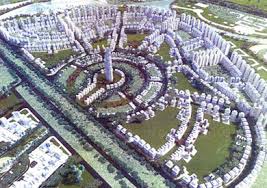
Nature of work
A town planner is involved in making long and short-term decisions about the management and development of cities, town, villages and the countryside. He/she aims to balance the conflicting demands of housing, industrial development, agriculture, recreation, transport and the environment, in order to allow appropriate development to take place. Some planners specialize in a particular area of work, such as protecting the historical environment or urban design, while others work across a variety of areas. In general, key planning activities include:-Developing creative and original planning solutions to satisfy all parties.
-Consulting with stakeholders and other interested parties and negotiating with developers and other professionals, such as surveyors and architects.
-Assessing planning applications and enforcing and monitoring outcomes as necessary.
-Researching and designing planning policies to guide development.
- Analyzing data for strategic developments, such as increases in affordable housing provision.
-Designing layouts.
-Using IT systems such as CAD (computer-aided design) or GIS (geographical information systems).
-Keeping up to date with legislation associated with land use.
-Promoting environmental education and awareness.
Environment of work
Working hours vary according to the sector and work levels. Normal working hours are from 8.30 am to 3.30 pm. Some senior positions require additional commitment. Flexi-time is often available, particularly in the public sector. There may be considerable contact with the public, politicians, that means it will involve evening or weekend meetings. The work is largely office-based, but many planners make site visits, meet clients and attend external meetings. Career breaks and job shares are possible. Self-employment or freelance work as an independent consultant is an option for experienced planners. A specialism in a certain area of planning can help him/her stand out from competitors, although it is important to have a diverse client base to maximize opportunities for income. Travel within a working day to meetings or site visits can form part of the job, but overnight absence from home is rarely necessary. Overseas work may be required occasionally with some consultancies. He/she often collaborates with public, officials, engineers, architects, and developers, and must give presentations, attend meetings, and manage projects. Professional life
There are opportunities for town planners to move between local organizations, so development in the public sector is likely to depend, to a certain extent, on geographical mobility. Movement between the private and public sector is also possible. With experience it is possible to specialize in different areas of planning, such as: urban design, regeneration, conservation, community engagement, sustainable development.He/she may need to move to different departments within the organisation to make use of his/her specialism. An experienced planner may also choose to move into a different but related industry, the skills and experiences of a planner are transferable to areas such as planning law and market research
Range of typical starting salaries: 55000 SYP.
Getting the job
Most town planners have a master’s degree from an accredited urban or regional planning program. Some planners have a background in a related field, such as public administration, architecture, or landscape architecture. An aspiring planner with a bachelor’s degree but not a master’s degree can qualify for a small number of jobs as assistant or junior planners. Candidates with a bachelor’s degree typically need work experience in planning, public policy, or a related field. Skills
There are many skills he/she needs to have and tries to improve, such as:Analytical skills. He/she uses statistical techniques and technologies, such as geographic information systems (GIS), in their analyses to determine the significance of the data.
Collaboration skills. He/she often works with or receives input from public officials, engineers, architects, and interest groups. Some may act as mediators when these groups have conflicting opinions.
Decision-making skills. He/she must weigh all possible planning options and combine analysis, creativity, and realism to choose the appropriate action or plan.
Management skills. He/she must be able to manage projects, which may include overseeing tasks, planning assignments, and making decisions.
Writing skills. He/she needs strong writing skills because he/she often prepares research reports, write grant proposals, and correspond with colleagues and stakeholders.
Sources and references
If you need any further information on what is included in this file, you can visit the following websites:- www.rtpi.org.uk, Royal Town Planning Institute
- The Order of Syrian engineers, Damascus, Tel: 6627256
- www.arab-eng.org, Arab Engineers Forum.
- Arab Standard Classification of Occupations, 2008, Ed. Arab Labor Organization.
Summary
A town planner is involved in making long and short-term decisions about the management and development of cities, town, villages and the countryside. He/she aims to balance the conflicting demands of housing, industrial development, agriculture, recreation, transport and the environment.He/she is at the heart of regeneration within towns and cities, taking into consideration the often competing views of business and local communities.
